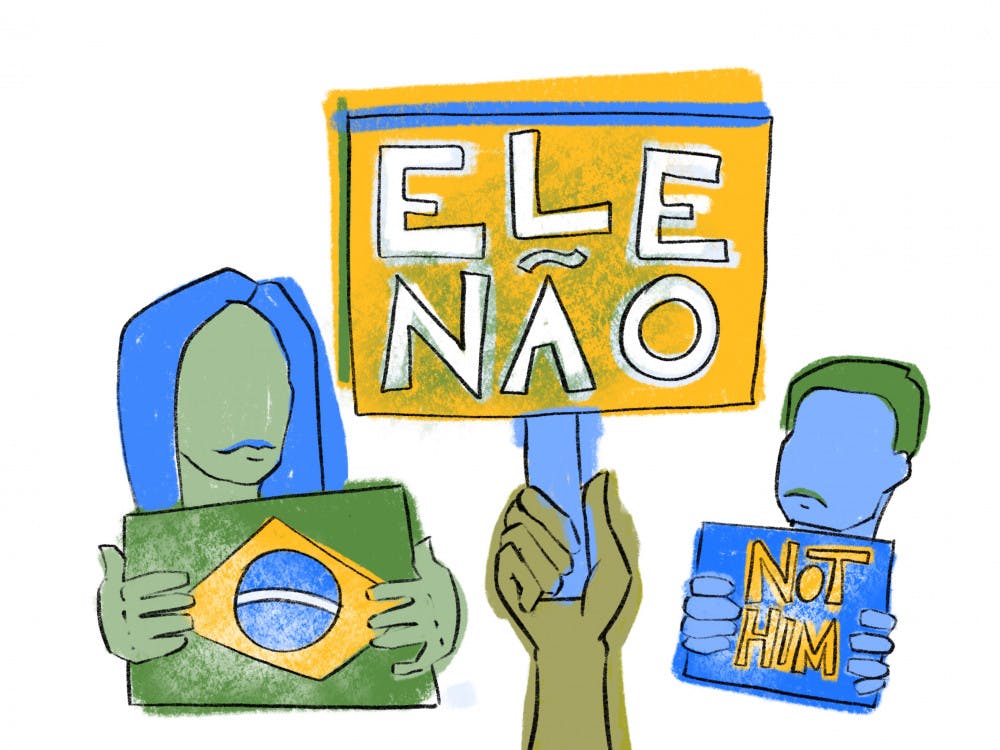A group of Brown students and faculty, along with academics and activists across the United States, have created a petition campaign opposing Brazilian presidential candidate Jair Bolsonaro. The petition criticizes Bolsonaro for “aggressive and vile hostility toward women, people of African descent, the LGBT+ community, indigenous people” and low-income people. It also condemns his denigration of human rights, efforts to undo the “political, social, economic, labor and cultural gains of the last four decades” and his threat to “undermine the still fragile democratic politics that people throughout Brazil have risked so much to build.”
Initiated by a group of Brown students, the petition has received over 1,000 signatures from students, academics and activists from 38 states and over 200 colleges and universities, said James Green, director of the University’s Brazil Initiative and one of the petition’s initial sponsors. The petition is “designed to educate people about the situation in Brazil and call on people to stop a very, very conservative right-wing candidate,” he added.
The petition is as much a show of solidarity among activists in the United States as it is a tool for raising awareness among Americans. The petition is not necessarily directed at people in Brazil, said Beatriz de Arruda ’19, one of the petition’s creators.
“We know that nothing we can do could ever influence people’s opinions about this election because they have already been bombarded by so much wrong information, and so many people a thousand times more important than us have already opposed him and his policies,” she said.
“If people in Brazil aren’t listening, I don’t think there’s anything that we can do. … But what I think that we can do is show that there is resistance among academics in the U.S., among people who care about Brazil, and … help validate the people that are terrified in Brazil.”
De Arruda was inspired to start the petition after she learned about women-led protests against Bolsonaro in Brazil Sept. 29 and attended a protest led by Brazilians in Boston, she said. In order to reach as many people as possible, the students created a website to share the petition with their peers across the country and increase support, she said.
If elected, Bolsonaro will “immediately begin a process to eliminate democratic rights in the country,” Green said. “He wants to criminalize social movements and NGOs, he is against the recognition of the territories of indigenous peoples in Brazil” and the return of ancestral lands to the descendants of runaway slaves, he added.
Along with the threat to marginalized communities, there is also concern among many that a Bolsonaro victory could lead to a return to military dictatorship, Green said.
“He will erode democracy, which is relatively fragile,” he said. Brazil has “only had a constitution for the last 30 years and return(ed) to democratic rule only 35 years ago after a 20-year dictatorship. He actually thinks that the dictatorship was a good time for Brazil.”
“I believe that democracy in Brazil is in a really critical moment, that all of the social gains that people fought so much for might be undone in a few years,” de Arruda said. “I believe that our freedom to express ourselves or to oppose the government might be gone, and I believe that thousands of people in Brazil, particularly vulnerable populations, are at risk.”
Bolsonaro “has expressed, very often, hate against minorities, and he has fostered hate speech in Brazil” and has “used a lot of strategies to win votes that could be considered undemocratic, such as spreading fake news through social media,” de Arruda said.
“Over the past weeks, there has been a spike in cases of aggression against minorities in Brazil by (Bolsanaro’s) supporters,” de Arruda said. “He represents a big threat to democracy in Brazil, to all the social movements in Brazil. People have fought a lot to guarantee the rights of minorities in Brazil. … Now all of those rights that we acquired through the decades are threatened.”
Though the petition is intended to be non-partisan, in an election with only two candidates, the “obvious implications are to vote for the other candidate,” Green said. But the group “didn’t want to be partisan in the sense of calling on people to vote for the other candidate. If a person doesn’t want to support the candidate then I’d rather they would … not vote at all than to vote for this far right-wing candidate,” he added.





